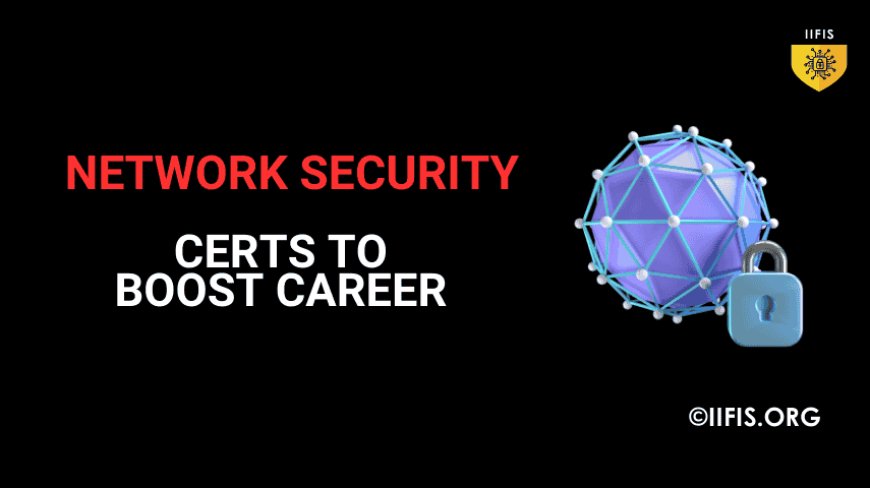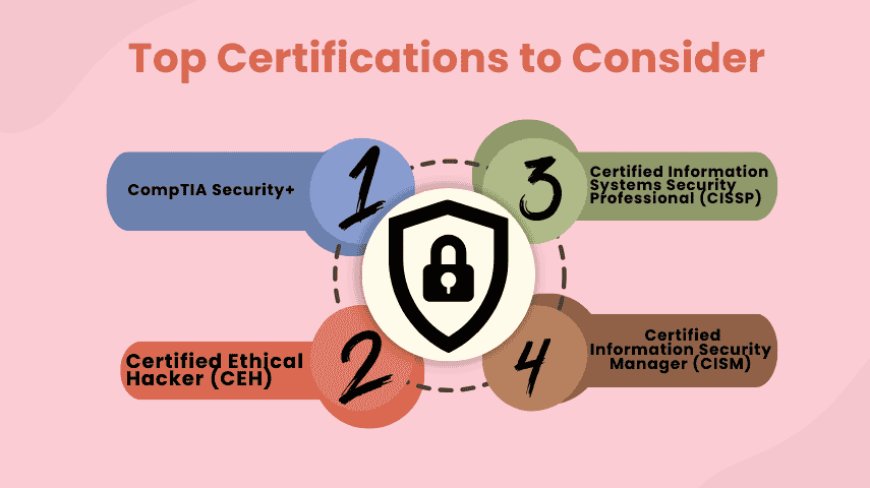Network Security Certs to boost Career
Advance your career with top network security certifications! Enhance your skills, secure systems, and open doors to high-demand cybersecurity roles. Start your journey today.

In the growing field of cybersecurity, certifications are a great way to prove your skills and knowledge. Employers often look for certified professionals who can protect their systems from threats and keep sensitive information safe. Whether you're just starting out or aiming for a senior role, network security certifications can open doors to better job opportunities and higher pay.This blog will explore some of the top certifications you should consider, how they help you gain practical skills, and which ones align best with your career goals. From foundational certifications like CompTIA Security+ to advanced options like CISSP and CEH, we'll break down what each one offers and why it’s worth pursuing. If you’re ready to strengthen your expertise and make your mark in cybersecurity, read on.
The Importance of Network Security Certifications
Certifications are a key part of building a successful career in cybersecurity. Here's why they matter:
1. Certifications Prove Your Skills and Knowledge
-
Employers need to know you can protect their systems from threats, and certifications act as proof of your expertise.
-
They validate that you’ve been trained in important areas like risk management, firewalls, intrusion detection, and encryption.
-
With certifications, hiring managers don’t have to guess your abilities—they see clear evidence of your training and knowledge.
2. They Offer Practical Learning Opportunities
-
Many certification programs include hands-on labs and real-world scenarios, allowing you to practice what you’ve learned.
-
For example, certifications like CompTIA Security+ or CEH teach you to handle tasks such as detecting and responding to security breaches.
-
This practical experience boosts your confidence and prepares you for challenges you’ll face in the workplace.
3. Boost Career Growth
-
Having certifications can set you apart from other candidates during job applications, increasing your chances of getting hired.
-
They often lead to promotions and leadership roles because they show you’ve invested in your skills.
-
Advanced certifications like CISSP or CISM can position you for senior roles like Security Manager or Cybersecurity Consultant.
4. Increase Your Earning Potential
-
Cybersecurity professionals with certifications tend to earn higher salaries compared to those without them.
-
Certifications such as CISSP, CEH, or CISM are well-recognized by employers and often come with salary premiums.
-
Investing in certifications can be a stepping stone to higher-paying roles.
5. Stay Updated with Industry Standards
-
Certifications often require you to renew or update your knowledge every few years, ensuring you stay current with industry trends.
-
Cybersecurity threats are always evolving, and certifications help you learn the latest tools, techniques, and best practices.
By earning network security certifications, you not only improve your expertise but also open doors to better job opportunities, career growth, and financial rewards.
Choosing the Right Certification
Here’s how to select the best network security certification for you:
-
Align with Career Goals:
-
Beginners: Start with CompTIA Security+.
-
Advanced roles: Consider CISSP or CISM for leadership positions.
-
Match Your Experience:
-
Entry-level: Certifications like CEH or CompTIA Security+.
-
Intermediate: Try CISA or Cisco Certified CyberOps Associate.
-
Advanced: Look into CISSP or GIAC Security Expert (GSE).
-
Check Industry Demand:
-
Research job postings to identify certifications valued by employers, such as CISSP for security management or CEH for ethical hacking.
Choose a certification based on your career stage, goals, and the needs of the job market.

Entry-Level Network Security Certifications
If you’re starting a career in network security, earning an entry-level certification is a great way to build your skills and stand out to employers. Here are two popular certifications to consider:
1. CompTIA Security+
-
Overview:
CompTIA Security+ is a widely recognized certification that lays the groundwork for a career in cybersecurity. It’s vendor-neutral, meaning it applies to a broad range of technologies and systems. -
Topics Covered:
-
Basic security concepts like encryption, authentication, and secure protocols.
-
Risk management, including identifying and handling security risks.
-
Incident response strategies to manage and recover from security breaches.
-
Who It’s For:
Ideal for beginners with little to no cybersecurity experience. It’s a great starting point for roles like Security Analyst, IT Administrator, or Network Security Specialist.
2. Certified CyberOps Associate
-
Overview:
This certification focuses on foundational cybersecurity knowledge and teaches you how to monitor and respond to security threats using Cisco tools. It’s designed to help you understand the basics of security operations. -
Benefits:
-
Provides a solid introduction to cybersecurity monitoring, analysis, and response.
-
Helps you gain practical skills for working in Security Operations Centers (SOCs).
-
Who It’s For:
Best suited for individuals new to the field who are interested in roles like Security Operations Analyst or SOC Technician.
Both certifications provide a strong start for your journey in network security, offering foundational knowledge and the skills needed to enter the industry with confidence.
Intermediate Network Security Certifications
Here are some certifications to consider for advancing your career in network security:
1. Certified Network Defender (CND)
-
Overview: Focuses on skills like network monitoring, detecting security threats, and handling incidents.
-
Career Roles: Prepares you for roles such as Network Security Administrator or Cybersecurity Analyst.
-
Practical Applications: Covers real-world tasks like configuring firewalls, analyzing network traffic, and securing systems.
2. Certified Ethical Hacker (CEH)
-
Overview: Trains you in penetration testing and identifying system vulnerabilities.
-
Importance: Useful for both offensive roles (ethical hacking) and defensive roles (improving system security).
-
Career Roles: Ideal for jobs like Penetration Tester, Security Consultant, or SOC Analyst.
3. Certified Network Associate Security (CNA Security)
-
Overview: Focuses on securing networks using Cisco technologies and building a strong foundation in network security.
-
Career Opportunities: Suitable for roles like Network Security Engineer or Network Administrator.
-
Practical Skills: Teaches tasks like configuring secure networks and managing Cisco devices.
These certifications help you develop specialized skills and prepare for mid-level roles in network security.
Advanced Network Security Certifications
Here are some top certifications for experienced professionals looking to advance in network security:
1. Certified Information Systems Security Professional (CISSP)
-
Overview: Known as the gold standard in cybersecurity, CISSP covers areas like risk management, security architecture, and software development security.
-
Career Paths: Opens doors to roles such as Security Consultant, Security Manager, or Security Architect.
-
Focus: Ideal for those aiming to lead and design secure systems on an organizational level.
2. Certified Information Security Manager (CISM)
-
Overview: Focuses on managing and leading information security teams.
-
Ideal For: Professionals moving into management roles such as Security Manager or Information Security Officer.
-
Key Areas: Covers governance, risk management, and incident response planning.
3. Certified Information Systems Auditor (CISA)
-
Overview: Specializes in auditing, compliance, and governance of security systems.
-
Career Roles: Prepares you for roles like IT Auditor or Compliance Analyst.
-
Importance: Ensures organizations follow security and regulatory standards effectively.
These certifications are suited for professionals looking to specialize in high-level technical or managerial positions within network security.
Specialized Certifications for Niche Roles
1. Security Essentials Certification (SEC)
-
Overview: Covers cybersecurity fundamentals, including threat detection, cryptography, and security monitoring.
-
Application: Suitable for roles like Security Analyst or Systems Administrator where broad cybersecurity knowledge is essential.
2. Offensive Security Certified Professional (OSCP)
-
Overview: Focuses on advanced penetration testing techniques with a strong emphasis on hands-on ethical hacking.
-
Recognition: Highly respected for demonstrating practical expertise in identifying and exploiting vulnerabilities.
3. Certified Cloud Security Professional (CCSP)
-
Overview: Specializes in securing cloud infrastructures and managing cloud-specific risks.
-
Opportunities: Ideal for roles like Cloud Security Architect or Cloud Engineer.
Preparing for Certification Exams
-
Study Resources: Use books, online courses, and official certification guides.
-
Effective Preparation: Manage your time, practice with labs, and take mock exams to build confidence.
-
Hands-On Experience: Real-world scenarios and labs help you understand practical applications and perform better in exams.
By focusing on specialized certifications and solid exam preparation, you can excel in niche roles and grow your career in cybersecurity.
Career Benefits of Network Security Certifications
-
Higher Earning Potential: Certified professionals often command higher salaries compared to non-certified peers. Certifications like CISSP or CEH can significantly boost your income.
-
Recognition and Credibility: Certifications validate your skills, making you a trusted professional in the cybersecurity field.
-
Advanced Roles: Open doors to roles like Network Security Engineer, Security Analyst, or Security Architect, where expertise is highly valued.
Staying Updated and Continuous Learning
-
Maintaining Certifications: Certifications often require continuing education or periodic renewal, ensuring your knowledge stays current.
-
Keeping Up with Trends: Stay informed about new tools, technologies, and techniques by attending webinars, reading industry blogs, and joining professional networks.
-
Additional Certifications: As technology evolves, pursuing certifications in emerging areas like cloud security or advanced threat management can keep your career growing.
Consistent learning and staying updated ensures long-term success in network security.
Network security certifications are a powerful way to build your skills, increase your earning potential, and unlock career opportunities in roles like Security Analyst, Network Administrator, or Security Architect. They provide practical knowledge, validate your expertise, and help you stay competitive in the ever-evolving field of cybersecurity.
Ready to take the next step? Choose the certification that matches your goals and start your journey. Share your progress, subscribe for more tips, or connect with IIFIS for personalized advice and guidance to help you achieve your career goals. Let’s grow together in the field of network security























